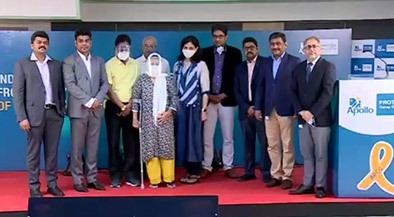ITANAGAR, 29 Jun: Setting a milestone in the annals of Indian medical services, the Apollo Proton Cancer Centre in Chennai for the first time in India successfully performed a ‘mega prosthesis fixation’ for femur (thigh bone), including removal of cancerous tumours in kidneys, in a single stage surgery through a multimodal approach.
The surgery was performed on a 54-year-old woman from Assam who had sustained a fracture on her left thigh bone and was bedridden for two months. The patient was also diagnosed with Stage IV kidney cancer (metastatic left renal cell carcinoma).
The multimodal team of doctors who performed the surgery includes orthologists Dr Vijay Kishore Reddy, Dr Kunal Patel, and Dr Vishnu Ramanujam, uro-oncologists Dr Srivathsan Ramani and Dr Sanjay Prakash, medical oncologist Dr Raja T, plastic surgeon Dr Chepauk Ramesh, and anaesthetist Dr Anand Muragesan.
“Earlier, the case was discussed by the Multidisciplinary Tumour Board and was planned for surgical resection of the pathologic fracture in the femur and radical removal of the kidney through minimally invasive methods in order to put on her feet as early as possible,” the hospital said.
The patient successfully underwent both procedures simultaneously at the Apollo Proton Cancer Centre, in a procedure that lasted around six hours. The knee joint containing the tumour was removed with wide margins and replaced with a mega prosthesis.
She also underwent laparoscopic radical nephrectomy, which was performed through three tiny 5 mm holes in the abdomen in the same sitting. In view of the local nodal spread in the CT scan, comprehensive nodal clearance was also performed in order to give a better survival rate. After the procedure, the patient was mobilized the very next day and made to walk after almost three months in plaster.
Anaesthetizing a kidney cancer patient with bone metastasis is a real challenge due to the risk of blood clot in the blood vessels that can cause lung attack (pulmonary embolism) during and immediately after surgery. Pain after this surgery can be very severe and many times difficult to treat as patients can experience preoperative pain due to rapidly growing tumours, painful neuropathies and opioid tolerance in the operating room. The need for a robust anaesthesia and surgical ICU unit and the expertise of the anaesthesiologist is of prime importance in managing anaesthesia and pain management in these patients.
This multimodal approach allows for earlier mobilization, lesser hospital stay and reduced postoperative morbidities. Both the procedures being done in the same sitting of surgery allows to reduce costs drastically. This is possible only with multimodal management where highly specialized doctors in their individual fields collaborate for optimum patient care to achieve excellent functional and oncological outcomes.


